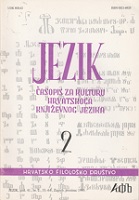Brojevne izvedenice
Numeral Derivatives
Author(s): Lana Hudeček, Dragutin RagužSubject(s): Morphology, Syntax, Lexis, South Slavic Languages
Published by: Hrvatsko filološko društvo
Summary/Abstract: The paper discusses the normative status of numeral derivatives in Croatian: derivatives with the suffixes -icn/-ka (dvica - dvojka), those with the disputed suffix -e!/-or ( in examples such as perero/petoro, peterica/petorica, peterka/petorka; peterke/perorke, peterci/pelorci), and compounds of the type peterosoban/petosoban and petnaest(o)godišnjak. The following solutions are proposed: in derivatives with the suffixes -er/-or, only forms with -er should be accepted; derivatives with the suffix -ica mean (a) with collective bases, ''collections of male persons" (dvojica, četverica, peterica, etc.), (b) with cardinal/ordinal bases, "the numeral! and what is designated by it" (dvica, trica, četvrtica, petica, šestica, sedmica, osmica, devetica, desetica, jedanaestica, etc.); the suffix -ka with the collective base is used to refer to '"a particular grouping of people or animals held together by the same aim or task" (trojka, četvorkn); this means that the "numeral and what is designated by it" is not expressed with the suffix -kn. In the case of the variants petero-/ peto-, the distribution of meaning is not as neat, since three meanings (collective, numeral and ordinal) are expressed by two forms.
Journal: Jezik: časopis za kulturu hrvatskoga književnog jezika
- Issue Year: 41/1993
- Issue No: 2
- Page Range: 46-56
- Page Count: 11
- Language: Croatian

